
Adriano Celentano is an Italian musician, singer, composer, actor, and filmmaker. He is dubbed "il Molleggiato" because of his dancing.

Alberto Moravia was an Italian novelist and journalist. His novels explored matters of modern sexuality, social alienation and existentialism. Moravia is best known for his debut novel Gli indifferenti (1929) and for the anti-fascist novel Il Conformista, the basis for the film The Conformist (1970) directed by Bernardo Bertolucci. Other novels of his adapted for the cinema are Agostino, filmed with the same title by Mauro Bolognini in 1962; Il disprezzo, filmed by Jean-Luc Godard as Le Mépris ; La Noia (Boredom), filmed with that title by Damiano Damiani in 1963 and released in the US as The Empty Canvas in 1964 and La ciociara, filmed by Vittorio De Sica as Two Women (1960). Cédric Kahn's L'Ennui (1998) is another version of La Noia.

Alberto Lattuada was an Italian film director.

Dino Risi was an Italian film director. With Mario Monicelli, Luigi Comencini, Nanni Loy and Ettore Scola, he was one of the masters of commedia all'italiana.

Isa Barzizza is an Italian actress who has appeared in 46 films since 1947.

Angelo Infanti was an Italian film actor. He appeared in more than 90 films between 1961 and 2010. He was born on 16 February 1939 in Zagarolo, Italy. He died on 12 October 2010 in Tivoli, Italy due to cardiac arrest.

Marilù Tolo is an Italian film actress. She appeared in more than 60 films between 1960 and 1985.

Gino Santercole was an Italian singer/songwriter, guitarist, and actor. He was well known for his breakthrough hit "Questo vecchio pazzo mondo", a cover of P.F. Sloan's "Eve of Destruction," and for the song "Such a Cold Night Tonight" that he sang in the movie Yuppi Du.

Giuliana Calandra was an Italian film, television and stage actress, journalist and television hostess.

Dalila Di Lazzaro is an Italian model, actress and writer.
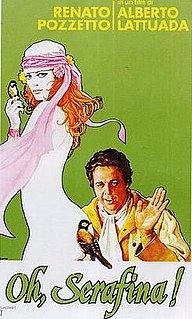
Oh, Serafina! is a 1976 Italian comedy-drama film directed by Alberto Lattuada.
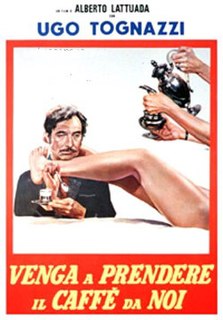
Venga a prendere il caffè da noi, internationally released as Come Have Coffee with Us, is a 1970 Italian comedy film directed by Alberto Lattuada. It is based on the novel La spartizione by Piero Chiara. The film was awarded with two Nastro d'Argento awards, for best screenplay and for best supporting actress.
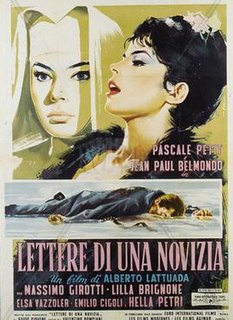
Lettere di una novizia is a 1960 Italian drama film directed by Alberto Lattuada. It is loosely based on the novel with the same title by Guido Piovene. The film was coproduced by France, where it was released with the title La novice.

Don Giovanni in Sicilia, internationally released as Don Juan in Sicily, is a 1967 Italian comedy-drama film directed by Alberto Lattuada. It is loosely based on the novel with the same title by Vitaliano Brancati.
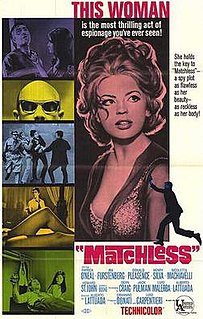
Matchless is a 1967 Italian science fiction-comedy film directed by Alberto Lattuada. It parodies the spy film genre.

Sono stato io is a 1973 Italian comedy-drama film directed by Alberto Lattuada. For his role Giancarlo Giannini was awarded as best actor at the San Sebastián International Film Festival.
The list of the 100 Italian films to be saved was created with the aim to report "100 films that have changed the collective memory of the country between 1942 and 1978".

The Beach also internationally released as Riviera and The Boarder) is a 1954 French-Italian comedy drama film directed by Alberto Lattuada and starring Martine Carol, Raf Vallone and Mario Carotenuto. In 2008 the film was selected to enter the list of the 100 Italian films to be saved.

Francesca Romana Coluzzi was an Italian actress. A respected dramatic actress on stage, she is probably best known for her roles in the commedia sexy all'italiana.
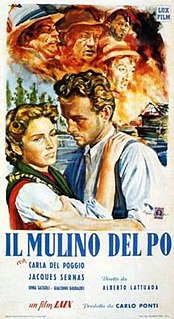
Il mulino del Po is a 1949 Italian drama film directed by Alberto Lattuada. It is based on the novel with the same name by Riccardo Bacchelli.



















